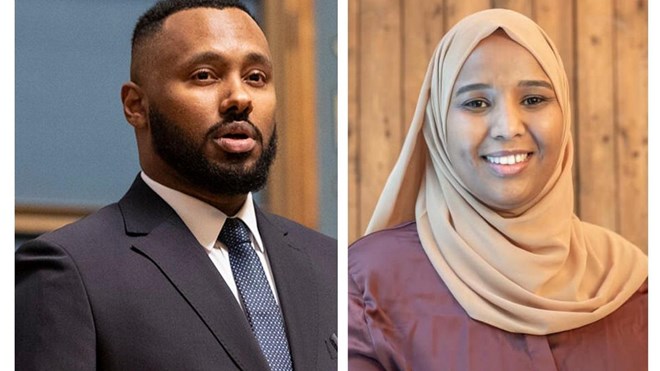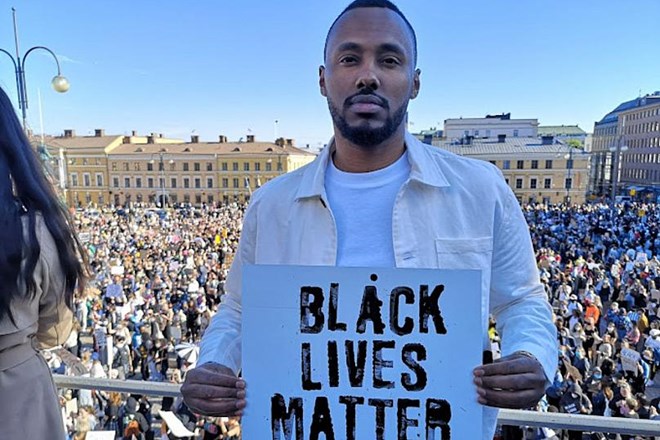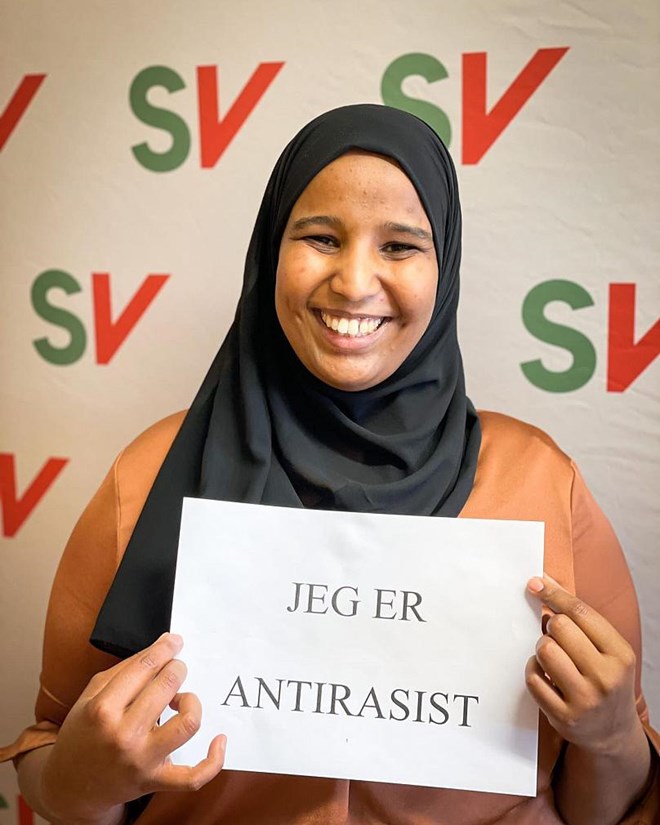World Refugee Day: Meet the Somali politicians breaking through in the Nordics

Source: euronews, By David Mac Dougall
Tuesday June 21, 2022

Composite image showing Suldaan Said Ahmed and Marian Hussein – Copyright Euronews
To mark World Refugee Day, Euronews profiles two Somalis and traces their journeys from arrival in the Nordics to their breakthroughs as politicians.
_In the Nordic region, the first Somalis arrived in the late 1980s and early 1990s. Later, as Somalia’s civil war became more intense, new arrivals came.
Now, the first generation of Somali refugees is making their mark in politics, from local council level to the national stage.advertisements‘Many challenges in small cities for immigrants’
Suldaan Said Ahmed is Finland’s first member of parliament with a Somali background. His family came to the Nordic nation as refugees on family unification visas when he was a teenager, to join his brother who was already living there.
At that time Finnish authorities had a policy to place refugees in different parts of the country, rather than concentrating them all in bigger cities, so Suldaan and his family went to live in North Karelia, a region in the northeast of Finland along the Russian border.
“It was a good time to live in North Karelia, to learn the language, start school and adapt to Finnish culture. But there are also many challenges in small cities especially when you have an immigrant background,” said 29-year-old Suldaan.
“Big cities always have more job opportunities, they are more tolerant. These smaller cities, since they don’t have a big number of immigrants, there is a lot of challenges,” he tells Euronews.
North Karelia’s main city, Joensuu, had earned itself a reputation as a dangerous place for immigrants in the early 1990s with violent attacks by skinheads a particularly nasty problem, prompting a great deal of concern for Suldaan’s mother who wanted to move the family to London.
“We got together and said ‘mum, since childhood we have been moving from place to place, and every time we have to start to adapt to a new language and new culture. But we understand that you feel loneliness as a single mother with no other Somali people and no other African people. So maybe we make a compromise and move to Helsinki where there is a bigger diaspora?'”

Suldaan Said Ahmed attends a Black Live Matter rally in Helsinki, June 2020David Mac Dougall
Suldaan’s political activism started only after the family moved to Helsinki, and he saw the breakthrough of the right-wing True Finns Party in the 2011 election.
This, he decided, was a wake-up call to stand up against racism and xenophobia, and he reached out to the Left Alliance political party asking to become a candidate before the next local council elections.
The first election didn’t go his way, and he didn’t get enough votes for a seat on the Helsinki City Council, but he persevered.
“When I saw that I am not getting elected I was disappointed. But I also decided I am a young man, I just moved here to Helsinki from North Karelia and 91 people decided I am the best person to take care of their interests. I said ‘Suldaan, this is a good start!'”
Fast forward to the next local elections in 2017 and by this time Suldaan had joined the Left Alliance, and already had a leadership position within the party’s management. When the votes were counted, he was elected to the city council with more votes than veteran campaigner Paavo Väyrynen – one of Finland’s most well-known politicians.
At the 2021 Finnish general election, Suldaan wasn’t voted directly to parliament, but within the party list system he replaced another Left Alliance politician to become the first Somali to sit in Finland’s parliament, representing Helsinki.
“Any time I get hate speech or a hateful message, and if I quit, these people win. Always someone who comes first makes a sacrifice and now young people from an immigrant background or different minority background at least they have some people they can call a role model.”

Norwegian MP Marian Hussein holds anti-racist sign, March 2022Marian Hussein
From social worker to politician
In Norway, Marian Hussein wasn’t only the first elected MP with a Somali background, she was the very first person of African descent to take up a seat in parliament in Oslo.
Her family moved from Saudi Arabia, where her father had been a migrant worker, when Marian was 10-years- old, and at first the new home shocked her.
“You come from one of the hottest areas of the world to one of the coldest. We came during winter time with snow, and we were not in the city but in a district close to Lillehammer, where they had the Winter Olympics,” Hussein,36, told Euronews.
One of the most eye-opening things for young Marian was the Norwegian education system, where boys and girls were allowed to attend public school – in their previous home only Saudi nationals had any rights to go to public schools while migrant worker families were banned.
Marian came into politics quite late, after she had already completed her education and been working as a social worker.
“I was engaged in different activities, but I never saw myself being in the political arena,” she said.
And like Suldaan, it was the election of right-wing politicians into government that made her consider getting more involved in politics at a national level.
“In 2013 in Norway, the Conservative Party took over and they started ruling with the (right-wing) Progress Party, and in that night I joined the Socialist Left Party,” she said.
There was still a great deal of uncertainty for Marian about how involved she should get, especially dealing with the idea that she didn’t know enough about politics, or lacked experience to join a TV debate.
But she had some role models she looked up to, like Palestinian politician Hanan Ashrawi.
“So I knew about women in politics, but I never thought I would be one!”
“It took me time to understand how much impact that I have, but it’s so important that in the last 20 years there has been a debate on how little integrated refugees are in Norwegian society to participating in debates where people are debating our history and our lives”
“It is so important to be in these discussions and tell them what is working and what is not working and how people live their lives and don’t let people who use fear as a political agenda.”
